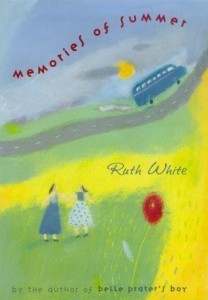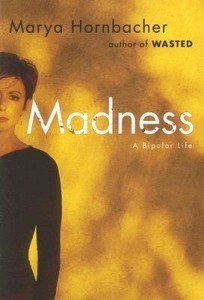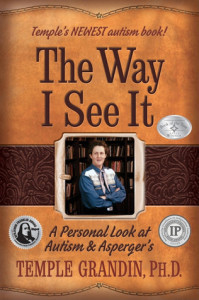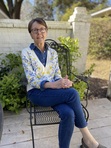Linda Vigen Phillips's Blog, page 11
September 16, 2013
TRIP DOWN MEMORY LANE
 Forty-three years ago my best friend from college and I sank a hundred dollars into a limping used car, packed a few essentials like our journals, hand-made flannel nightgowns, and our recent college degrees, and set out for NYC. We were small-town girls from Oregon out to see the world, and perhaps save part of it from unforeseen calamities.
Forty-three years ago my best friend from college and I sank a hundred dollars into a limping used car, packed a few essentials like our journals, hand-made flannel nightgowns, and our recent college degrees, and set out for NYC. We were small-town girls from Oregon out to see the world, and perhaps save part of it from unforeseen calamities.
We camped our way across the country, exuberantly savoring that long-sought glimpse of “the other side of the Rockies,” sometimes taking wild chances we probably shouldn’t have, while successfully sublimating growing concerns about survival in the Big Apple.
After a midnight arrival that was fraught with freeway terror, we landed in a flea-bag hotel where we slept with the lights on for fear of being murdered before morning or being eaten alive by bugs. As it turned out, we survived but many of our belongings didn’t. I think I was the one who left the window open in the car that the desk clerk conveniently told us to park around the corner. We were robbed of many of Cindy’s clothes, my flute, and a big chunk of our starry-eyed enthusiasm.
We doggedly hit the pavement in pursuit of work, while my father called regularly to urge me to come home, and Cindy began to know for sure that NYC wasn’t her bag. She got the first job that lucky for her, took her out of the city to Virginia leaving me still unemployed and without a roommate.
I stuck it out, eventually got another roommate, landed a good job with the New York Association for the Blind, and ultimately met the man whom I would marry.
Cindy and I have kept in touch all these years, enjoying an enduring friendship and bond that we’ll both jokingly acknowledge grew out of some common neurotic tendencies. So last week we left our husbands at home and revisited our old stomping ground. It was a triumphant visit. No robberies, no job worries, many shared grandkid stories, and lots of wry-humored, senior moments.
We handily maneuvered the subways and packed in a Broadway play, several museums, a little shopping, and countless laughs. And one thing we decided for sure. Long-standing friendships like ours are treasured gifts worth celebrating in a Big Apple way at least once every forty-three years.
September 9, 2013
So Much to Tell You by John Marsden
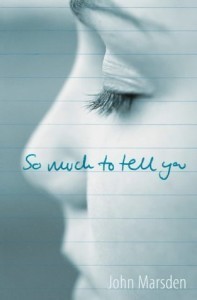 I recently happened onto a tiny YA book (only 119 pages) called So Much to Tell You by an Australian author named John Marsden, and I’m absolutely blown away by this author’s personal journey and this, his debut book.
I recently happened onto a tiny YA book (only 119 pages) called So Much to Tell You by an Australian author named John Marsden, and I’m absolutely blown away by this author’s personal journey and this, his debut book.
Marsden dropped out of law school and spent his early twenties drifting and directionless, unable to find a career that fit. He reports trying thirty-two jobs, including working in a mortuary and delivering pizzas. This ultimately led to depression and suicidal thoughts, after which he was admitted to a psychiatric hospital. He credits that stint as a key turning point in his life. “It actually was very, very helpful, very constructive and very useful. Because I started learning about feelings and relationships and communication, and the way the world really worked.”
He eventually found his niche in education, where he now is principal of a school he founded. Concurrent with his career in education is his enormous success as a writer. So Much to Tell You was written in three weeks in 1987, and it quickly earned Australia’s book of the year award in 1988. He has gone on to write over forty more books, won just about every award there is, and has been named “Australia’s most popular author today in any literary field by The Australian newspaper.” His most acclaimed work, a seven-book series called Tomorrow, When the War Began is definitely on my to-read list.
So back to So Much to Tell You. Marina has been sent to boarding school and she isn’t sure why. Maybe because she didn’t progress well in the hospital, or maybe her mother doesn’t like to look at her face, or maybe so she will begin talking again. She hates pretty much everything about school and her life, except the assigned journal and that is how she tells her story.
Marsden has paced the book perfectly, gradually revealing the horrific reasons why Marina has stopped talking and the circumstances that permanently scarred her face and her spirit. True to his intent, Marsden majors in feelings and relationships and communication in this book. Mr. Lindell, the English teacher who assigned the journal, reaches out to Marina, as do several of the students in her dorm. They keep at it until she begins to open up through notes, half-smiles, home visits, and tears.
I won’t ruin the ending but not unlike Laurie Halse Anderson’s Melinda in Speak, the true breakthrough comes when Marina confronts the beast. This book artfully and gracefully tells a heartbreaking story, and you won’t be able to put it down.
September 3, 2013
MEMORIES OF SUMMER by Ruth White
If you’ve been following my blog you know that my book, CRAZY, is about a teen dealing with her mother’s bipolar disorder in the sixties. That’s why I tend to read books like MEMORIES OF SUMMER, which is a different twist on the same theme.
Newbery Honor author Ruth White’s book tells the story of a sixteen-year-old girl in the fifties who slips into schizophrenia shortly after her family moves from an isolated holler in Virginia to Flint, Michigan. The move is a dream-come-true for Summer and her younger sister, Lyric, until Summer’s already different ways begin escalating. She drops out of school, neglects her appearance, begins talking to voices she hears, and becomes increasingly paranoid.
The story is told through the voice of Lyric, Summer’s thirteen-year-old sister who has warm memories of Summer taking over for their mother when she dies during their childhood. The sisters were always close and their harmonizing abilities were in demand at parties and church gatherings. But Lyric noticed from an early age that her older sister had peculiar ways. She was so afraid of electricity she would not go into a dark room to turn on a light. She sat apart, whispering to someone who wasn’t there. She huddled under a blanket in a corner because someone with a searchlight was trying to get her.
Even though their father struggles to make ends meet, Summer sees a psychiatrist who tries to control her increasingly severe symptoms with medication. On Lyric’s fourteenth birthday Summer seems well enough to go shopping with her. It quickly deteriorates when they have an embarrassing encounter with Lyric’s school friends, followed by Summer running off to meet up with a man she had been secretly phoning. With increasing wandering off, self-mutilation and playing with matches, Summer can no longer be left alone.
The psychiatrist tells the girls’ father to take the burden off of Lyric by hiring caregivers, but most of them quit after a short stay. When Lyric tries to get her to the basement during a tornado warning, she refuses because she says there were wolves down there. She hits Lyric on the head with a cup, sending her to the doctor for stitches. Lyric and her father realize they can no longer give Summer the care she needs, and they take her to the state mental hospital.
“We hope to take her home with us again someday,” Lyric said.
“I’ll not lie to you, Lyric,” Dr. Solomon said seriously. “You won’t ever again see the pretty, vivacious teenager who was your sister. She is gone. I have never known a schizophrenic to recover completely.”
While it remains true that one does not ever recover from schizophrenia, it is the exception, not the rule, to be permanently hospitalized with this disorder today. Modern medical practices and improved antipsychotic drugs have made it possible for many with this disease to lead relatively normal lives. Here are just two of the many resources available online.
www.helpguide.org/mental/schizophrenia_treatment_support.htm
psychcentral.com/disorders/sx31t.htm
August 26, 2013
LISTENING: A Neglected Language Art
Bet you can’t guess what we writers do in our spare time, so I’ll save you the trouble and tell you what this writer is doing. I’m learning to listen, and pun intended, it’s a novel idea!
Honestly, here’s the usual scenario. We (I’m the voice of ALL writers today) read until our eyeballs bulge, then we think until our brain aches, then we sit down and write until our printer runs dry, and then we take our precious gem somewhere and talk about it until someone drags us off center stage. Let’s see, and then there’s listening. Of course! We go to conferences and listen to all those experts tell us how to make our work better, and while they are speaking, we are already working out the details of our next magnum opus.
So back to what I’m doing in my spare time. I signed on for fifty hours of Stephen Ministry Training at my church, thinking maybe I could be of service to someone in need once in a while. Whoa! You can imagine my alarm during the first meeting when I discovered how plotting my next novel in the back of my brain while someone is speaking to me does not qualify as listening. I’m not talking about being in an audience listening to a speaker. That truly is an appropriate birthing room for new ideas. I’m talking about being in a critique group when another writer is reading her work, or in the kitchen when my husband is telling me something important, or with one of my children or a good friend when he or she is sharing big news.
I found out through roll-playing with my fellow trainees that in order to qualify as a good listener I need to engage in the following:
make eye contact
face the speaker and nod appropriately
ask open-ended questions
use active and reflective listening
allow silence
pay attention to body language
listen to what is not said
Just a few weeks into this new venture, I can tell you this seemingly simple check list makes surprisingly hard work. I’m still months away from being a commissioned care-giver with an assigned care-receiver, but I can see how the quality of simple kitchen and coffee conversations with friends or family is bound to improve.
Listening is just one of the many techniques I will be fine-tuning over the next four months. The training manual says I’m going to stop being passive-aggressive and learn how to be more assertive (can’t wait for that one), perfect my confidentiality skills, get a better grip on my emotions, and learn how to be process rather than goal-oriented, just to name a few. To my way of thinking, if I pay attention and do all the homework, I might end up being an effective care-giver when the time comes. And from a writer’s point of view, who can argue that the skills mentioned in this paragraph, especially the fine art of listening, won’t make for better story telling down the road.
…………………….
NOTE: Congratulations to Linda Andersen who won the drawing for Lyn Miller-Lachmann’s book Rogue featured on last week’s post.
August 21, 2013
ROGUE by Lyn Miller-Lachmann
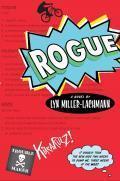 Shortly after I reviewed The Way I See It, by Temple Grandin, I received an email from Lyn Miller-Lachmann, whose recently released book, Rogue, is based on her own experience with Asperger’s Syndrome. I am thrilled that she has agreed to be a guest on my blog today, and to offer a publisher’s copy (Nancy Paulsen Books) of Rogue in a giveaway. If you will leave a comment with your email address I will enter your name in the drawing and announce the winner on Monday, August 26.
Shortly after I reviewed The Way I See It, by Temple Grandin, I received an email from Lyn Miller-Lachmann, whose recently released book, Rogue, is based on her own experience with Asperger’s Syndrome. I am thrilled that she has agreed to be a guest on my blog today, and to offer a publisher’s copy (Nancy Paulsen Books) of Rogue in a giveaway. If you will leave a comment with your email address I will enter your name in the drawing and announce the winner on Monday, August 26.
Linda: Welcome, Lyn. Tell us a little about your own experience with Asperger’s syndrome. How old were you when you were diagnosed? What, if any, special services have you received in or out of school? How has it impacted your life?
Lyn: I was not diagnosed until adulthood, because I grew up at a time when Asperger’s was not an officially recognized diagnosis and a great deal of stigma surrounded a child’s autism diagnosis—this was the era when people believed autism was the result of the cold, distant “refrigerator mother.” In those days, only the most severely affected children received the autism diagnosis, whereas today we understand autism as a spectrum with Asperger’s at the high-functioning end. As a result, I didn’t receive special services in school, though my mother had me meet with someone regularly when I was six—we played games where I learned how to take turns, and I remember enjoying those sessions very much—and sent me to charm school at a department store when I was thirteen. There, I didn’t have so much fun. I usually skipped out halfway with the daughter of one of her friends who was also forced to go, and we ate giant soft ice cream cones.
Even though I didn’t have an official diagnosis, I always knew I was different from the other kids. It was hard for me to make friends and understand social rules. I also had a hard time knowing what other kids thought of me, so I never could judge who was a friend, who was a foe, and when someone was taking advantage of me.
Linda: How closely is the protagonist modeled after you and your own experiences?
Lyn: Kiara is based on my own experiences, but I’ve turned the character into someone living in the present-day—or close to the present-day because the novel takes place in 2006, at the time that pharmacies began putting Sudafed behind the counters so large quantities could not be purchased and used to manufacture methamphetamine.
As with Kiara, kids that I wanted as my friends took advantage of me to facilitate their drug-related activities, and I had no idea what they were doing. I genuinely believed that I’d become part of the popular crowd. But that was a different time, and the drugs were different as well. Like Kiara, though, I experienced the disillusionment of finding out my friends weren’t really my friends, and the moral dilemma of whether to continue to associate with them in order to be seen as part of the popular crowd or to break off with them, and if I did stop associating with them, whether or not to tell an adult what they were doing.
Also true to my experience is the first chapter, where Kiara tries to sit with the popular girls because she thinks that will make her popular, and one of them pushes her tray to the floor. But I didn’t then slam the tray in the girl’s face. I wanted to, but my parents were strict and would have punished me severely.
Other aspects of Kiara’s background and experiences are very different from mine, most notably her family situation. I wanted her to be from a bilingual and bicultural family because that is an important reason why she hasn’t yet been diagnosed at a time in which our awareness of Asperger’s and autism is much greater. Her parents have their own struggles communicating, and people who aren’t aware of the research might believe that growing up with two languages led to Kiara’s temporary inability to speak (which happened to me as well in early elementary school). At the same time, Kiara’s experience of two languages helps her to understand people and their emotions, as it did for me much later when I started learning Spanish in middle school.
Linda: How did you hit on using the X-Men mutant as a hero figure? Was it actually something from your own childhood?
Lyn: I was attracted to the X-Men as a teenager because they, like me, experienced exclusion because they were different. However, in those days, there were no characters with whom I could identify the way Kiara identifies with Rogue, as Rogue didn’t appear until the early 1980s. The character I liked the most was Professor X, because he served as the mentor for the misunderstood mutants and guided them in the direction of good. I wanted a mentor like him.
Linda: Is there a sequel to Rogue planned? If not, what is your current WIP about?
Lyn: I don’t currently have a sequel in progress for Rogue. I just finished another YA manuscript, though, which is going to my editor after Labor Day, and I hope she accepts it. Titled ANTS GO MARCHING, it’s about a fifteen-year-old academic superstar, the only person from his hardscrabble mobile home park in an elite accelerated honors program at his suburban high school. When he suffers a concussion from a fight with three classmates and flunks out of the program, he has to decide whether to try to regain his old place or stay where he feels safe and accepted. The novel explores class and inequality, themes that I don’t think have gotten enough attention despite their effects on every young person in this country.
Linda: Tell us about your experience meeting Temple Grandin. Was it before, during or after your writing of Rogue?
Lyn: I have always admired Temple Grandin’s work, but I only met her recently, at the American Library Association annual conference this past June, where she was one of the main speakers. She stayed after her talk to sign books, and there were so many people waiting for her signature that she ended up staying about two hours afterward. I didn’t really talk much with her but I told her how much I admired her work and considered her an inspiration, as someone on the autism spectrum who has risen to the top of her profession because of her unique gifts. I also told her that my protagonist in Rogue was inspired and comforted by her and her work.
One of Temple Grandin’s books makes an appearance in Rogue. Near the beginning, a friend of Kiara’s family gives her a copy of Animals in Translation. Although Kiara isn’t much of a reader, except for X-Men comics, she gives Animals in Translation a go, thinking “if Temple Grandin wrote a book, she must have turned out all right.”
Linda: Tell us a little about your radio show and how it figures in your creative life.
Lyn: For more than seven years, I have been the assistant host of “Los Vientos del Pueblo,” a weekly bilingual radio program on WRPI featuring Latin American and Iberian (Spanish and Portuguese) music, poetry, and history. The longtime host of the program once worked as a translator for a radio station that presented news and music from various countries in Central and South America, but primarily from El Salvador. It was because of him that I decided to make Kiara’s mother from El Salvador. Many of my music selections in Rogue—particularly the songs that Kiara’s parents’ band plays—come from the “Los Vientos del Pueblo” playlist.
“Los Vientos del Pueblo” runs from 2-6 pm, Eastern Time, on Sundays and is live-streamed at www.wrpi.org. Once a month following this program, from 6-8 pm on Sundays, I host a program called “Mostly Folk World Tour,” which features traditional and contemporary music from around the world.
Linda: Thanks so much for sharing your personal story with us, Lyn and good luck with the book!
August 12, 2013
MADNESS by Marya Hornbacher
I just finished reading Madness, Marya Hornbacher’s account of her life leading up to and after the diagnosis of Type I rapid-cycle bipolar disorder, the most severe form of bipolar there is.
All I can say is Hornbacher’s first-hand experience made my own circumstance of living through my mother’s bipolar disorder seem like a cake walk. Hornbacher’s vivid descriptions of the emotional rollercoaster she was already on by the ripe old age of four give the reader a you-are-there feeling throughout. In a video interview www.idream.tv/madness-a-bipolar-life/ she admits that some of the writing was literally penned shortly after emerging from a manic or a depressive episode. It is so raw and ripe it drips off the page.
I was reminded of a Tom Clancy quote I keep taped to the wall in my writing corner to keep my own writing grounded: “The difference between fiction and reality is that fiction has to make sense.” Hornbacher’s memoir is full-blown reality and indeed, sometimes it didn’t make sense that one person could survive all the trauma she has lived through. She crumpled into a pile of tears and called herself fat at the age of five. By nine she was bulimic, into drugs and alcohol by thirteen, and at fifteen she was a full-blown anorexic. Along the way were multiple hospital visits, two of them because of nearly fatal situations. In one she “accidentally” cut an artery in her wrist when she was regularly cutting herself, and another time she was given one week to live when her weight dropped to 52 pounds. It seems she had lived a cat’s nine lives well before a psychiatrist finally hit upon the bipolar diagnosis when she was just twenty-four.
Today she is living a relatively normal life, although she cautions that she will always be bipolar and because of the nature of her particular diagnosis, there are still daily challenges. She must stay on meds that need to be closely monitored to accommodate the ever-changing chemical imbalance in her brain. She must remain sober, as alcohol completely cancels out the effectiveness of her meds. In addition, she has found yoga and non-compulsive exercise to be an important part of staying healthy.
I appreciate Hornbacher’s purpose in writing Madness as well as her first book, Wasted, in which she chronicles her struggle with bulimia and anorexia. When asked why she wrote such revealing and sometimes embarrassingly honest books, she says the writing “had everything to do with wanting to contribute a perspective that I felt was useful to the larger social conversation on mental illness.” Of Madness in particular, she says “I wanted there to be a book available to anyone that would open the door to the mind of someone with bipolar, so that there could be a more experiential understanding of the disorder and less a sense of bipolar as ‘other’ or strange.
“Ten years after Wasted I’ve found a greater laughter, a greater peace. If Wasted was, as one reviewer once said (to my never-ending entertainment), ‘a primal scream of a story,’ then I think Madness is a song.”
If you can withstand the raw realism of a bestselling memoir with no-holds-barred craziness, you will find this book both enlightening and hard to put down.
August 5, 2013
THE WAY I SEE IT by Temple Grandin
The most famous spokesperson for autism and Asperger’s that I know of is Dr. Temple Grandin, a high-functioning adult on the autism spectrum who has written many books on the subject, including The Way I See It. I was spellbound as she shared in some detail the struggles she has encountered, the knowledge she gained from studying the disorder, and the importance of the support she has received from her mother and other key persons in her life.
If you are not familiar with her story, I recommend watching the movie “Emergence” based on Grandin’s autobiographical book by the same name. You can also find her in several places on YouTube, such as this one: The World Needs All Kinds of Minds.
The book is very user friendly, particularly for parents or teachers seeking advice or help in diagnosing or dealing with a child anywhere on the spectrum. Here are just a few of the many nuggets of wisdom embellished with Grandin’s personal experience:
DIAGNOSIS AND EARLY INTERVENTION: “The best thing a parent of a newly diagnosed child can do is to watch their child, without preconceived notions and judgments, and learn how the child functions, acts, and reacts to his or her world.” (p.2) Grandin’s mother began seeking interventions when she observed the classic symptoms of no speech, no eye contact, tantrums, and constant repetitive behavior at the age of two and a half.
DIFFERENT TYPES OF THINKING: “Strategies that build on the child’s area of strength and appeal to their thinking patterns will be most effective.” (p. 14) Grandin believes all minds on the autism/Aspberger’s spectrum are detail-oriented, but they specialize in different ways. She notes three types of specialized thinking: Visual (thinking in pictures, like she does); Music and Math; Verbal logic.
EDUCATION: “Interests and talents can turn into careers. It is a mistake to stamp out a child’s special interests, however odd they may seem at the time.” (p. 34) Grandin’s mother encouraged her particular interest in art. Later she became fixated on cattle squeeze chutes after she discovered that getting into one herself relieved anxiety. Today she has a highly successful career as a designer of livestock facilities.
SENSORY ISSUES: “Sensory integration activities may help unscramble the child’s perception and enable information to get through—a prerequisite for any type of learning.” (p. 72) Grandin recalled that noises like the school bell hurt her ears to the point that it felt like “a dentist’s drill hitting a nerve. ” In the movie, “Emergence” she is depicted as a young adult being totally frightened by the sound and movement of revolving doors.
SOCIAL FUNCTIONING: “The way I see it, a huge mistake many teachers and parents make is to try to make people with autism or Asperger’s into something they are not—turn the geeky nerd into an ungeek, for instance.” (p. 132) “The people in the world who think that social connectedness is the ultimate goal of life forget that telephones, social networking websites, text messaging, and all the other electronic vehicles that fuel their passion to socialize are made by people with some degree of autism.” (p. 139) Grandin calls herself a nerd. She has had to learn social rules, but admits she will never acquire the social emotional relatedness that most people possess. She claims that her brain does not have the neural circuits necessary for her to function in such a way.
MEDICATIONS AND BIOMEDICAL THERAPY: “Little research exists on drug use in children. Doctors and parents need to be doubly careful and consider medications only after other behavioral/educational options have failed to alleviate the symptoms.” (p. 160) Grandin did not take any medications until her early thirties, when she went on anti-depressants to address constant anxiety and panic attacks. She also incorporates regular exercise and light therapy during the winter months. She believes she is one who will always need to take medication to counter a body chemistry that is “out of kilter.”
Dr. Temple Grandin has made and continues to make many valuable contributions to the fields of animal husbandry and autism/Asperger’s. I’ve not read her latest book, Different…..Not Less, which tracks the lives of fourteen unique individuals on the autism spectrum, but it’s at the top of my to-read list.
July 29, 2013
The WIP and I Take a Roller Coaster Ride
I am about half way through the first draft of my WIP, a Middle Grade adventure about a boy with learning disabilities who has left a science project until the last minute, the last minute being a family reunion during Spring Break at a castle in Switzerland. I entered a contest on the first ten pages. Didn’t win but the review was favorable. I’ve taken it to several different critique groups with mostly favorable comments. And I decided to farm it out to some teachers and a parent familiar with the learning disabled population. On that last move I got very mixed reviews. All of which sent me into a tizzy (wouldn’t you?) and also got me thinking (that’s the good news).
So here’s the thinking part. I DO have some choices right now. I could
a) scrap it (as one of my readers suggested)
b) rethink some very key parts like all the characters, the plot, the hook, and the voice (same reader’s suggestion)
c) write all the way to the end of my story
On the blog Adventures in YA Publishing author Stacey Kade recently made the case for that last option, not stopping to “fix” until you have a beginning, middle, and end. We writers can too easily become our own worst enemies as fear and compromised self-judgement stifle our work. Kade says “give yourself permission to write a crummy (stronger word used) first draft.” Buoyed by the encouragement in the aforementioned post I am going to write to the end and then see where I have been and where I need to go. Writing the following poem helped me sort out my thoughts and decide to keep forging ahead.
RIDING THE ROLLER COASTER
I couldn’t put it down
Stayed up until 2:00
There’s just a few little things…
The purpose of the book
is not well defined,
parts just don’t flow
or make sense.
The contest scale 1-10
Engaging character 8
Hooks reader 7
Voice 7
The characters are
just not very interesting.
There is no hook,
the protagonist is a dufus.
Scrap the whole thing,
write what you have knowledge of,
something closer to home,
something you have passion for.
I’m so glad
the lap latch held
because
this is
way
too much
fun.
July 22, 2013
Stop Pretending……by Sonya Sones
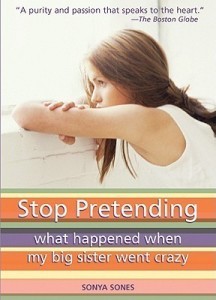 When I was finishing my forthcoming novel, CRAZY, someone suggested that I should read STOP PRETENDING….what happened when my big sister went crazy. I did read it with interest, and as my own book marches its way to publication, I recently reread it with even more intense interest.
When I was finishing my forthcoming novel, CRAZY, someone suggested that I should read STOP PRETENDING….what happened when my big sister went crazy. I did read it with interest, and as my own book marches its way to publication, I recently reread it with even more intense interest.
Sones book is written in her own voice as a thirteen-year-old who lives through the descent of her nineteen-year-old sister into manic depression. The simplicity of the free verse, while sprinkled with some loose rhyming and falling rhythm (one accented syllable followed by one or more unaccented syllables), reflects the fact that this is a Middle Grade book.
But Sones does not spare us any of the emotional traumas that she experiences as she watches her sister’s sudden, and at least in her eyes, unexpected breakdown one Christmas Eve. Having been an avid journal writer since her early teen years, Sones found her way to a poetry class led by the renown children’s poet, Myra Cohn Livingston. One of the assignments led to “Hospitalized,” a poem about visiting her sister in the psychiatric ward. Livingston encouraged Sones to continue with the theme as it would be helpful to others with similar family situations, and that was the beginning of this book.
I appreciated and related to the emotional roller-coaster life of someone in a family with a mentally disintegrating member. There was the fear that the same mental catastrophe would happen to her:
panic rises
grabs me at my throat
tightens its grip
won’t let
me go
The fear that she caused it:
Or maybe it was something that
I did.
The feeling that this is a joke, that her sister is putting on an act:
Stop this crazy act
and show me
that you haven’t changed.
The worry over “what do people think”:
People say
that Audrey Becker’s
odd.
They say
that her mother
chain-smokes cigars.
………
I wonder what they say about me.
The obsession to keep it a secret:
Sometimes
I worry that
the truth will break out all
over my face, like a fresh crop
of zits.
And then there were the unexpected perks, the signals that life goes on:
My art teacher
changes my life
when she sees me admiring
her gleaming Nikon
with the fancy lens
and asks:
“How’d you like to borrow it
for the weekend?”
And young love can happen even when your sister is in the psych ward:
I am in love with the new boy
in love with every
single
atom
of John.
And finally, there is the turning point, and hope:
“She knew me today.
She knew who I was
and I knew her, too.
She was there. Really there.
We talked about dreams.
She braided my hair.
We sat side by side
and played ‘Heart and Soul’.”
I love the honesty and simplicity of this book that deals with such a difficult subject. It should be an easy read for middle graders, and the experience would be enriched by a follow-up discussion with an adult or within a classroom setting.
My book, CRAZY, is YA, and deals with the mental illness of a mother rather than a sister. It is also semi-autobiograpical and portrays many of the emotions mentioned above but to a much deeper level. I share the same goal that Livingston suggested to Sones: that it would speak to young adults whose parent or sibling is in the throes of bipolar disorder (manic depression).
July 17, 2013
OneFourKidLit: Introductory Interview
Recently I have joined a wonderful online support group of approximately one hundred fifty authors who have debut books coming out in 2014. It is free and open to anyone who can satisfy the following requirements:
be publishing your debut novel in 2014 (this must be your actual debut, not just your debut in kidlit)
write young adult or middle grade fiction
be working with a traditional publisher (listed in the Children’s Writers & Illustrators Market, the Children’s Book Council, or on the supplemental list below)
I have already reaped the benefits of an immediate support group with whom I can compare notes and network. Writing is a lonely business, and to all writers out there, I strongly recommend this group, or something comparable, when it is your time to move into the spotlight with your first book.
So with that said, follow me over to OneFourKidLit.wordpress.com where you will find my introductory interview with this wonderful group of new friends……


